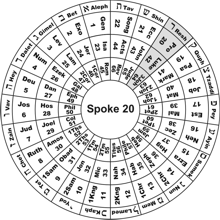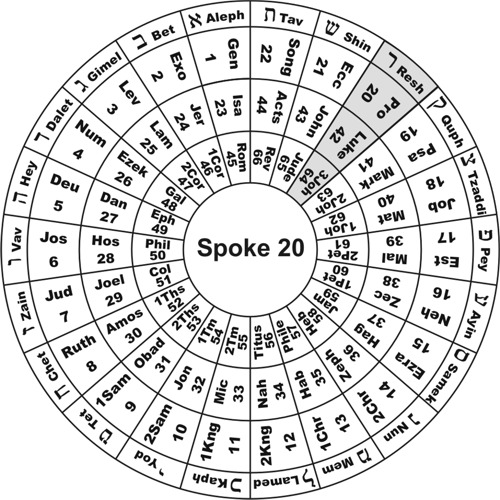The Friend of God
Forasmuch as many have taken in hand to set forth in order a declaration of those things which
are most surely believed among us, Even as they delivered them unto us, which from the beginning were eyewitnesses,
and ministers of the word; It seemed good to me also, having had perfect understanding of all things from the very
first, to write unto thee in order, most
excellent Theophilus, That thou mightest know the certainty of those things, wherein
thou hast been instructed.[Same purpose as Prov 1:3, 22:21]
Luke 1:1ff (Spoke 20, Cycle 2)
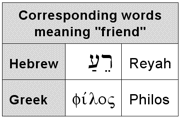 Luke
addressed his Gospel to the most excellent Theophilus, which means Friend of God, from
the roots Theos (God) and philos (friend). Most commentators think that
Theophilus was a real person, while others suggest he might be symbolic of all who would become a
friend of God through faith in Jesus. It does not really matter what Luke intended,
because the Divine Intent shines with perfect clarity. About 63% of all instances of philos
in the Five New Testament History Books appear in Luke's Gospel,
as shown in the graph below. This the links directly to its Hebrew equivalent,
the Resh KeyWord reyah. The theme based on these words distinctly flavors his Gospel,
as noted above by Geldenhuys and here again in this quote
Herbert Lackyer's All the Parables of the Bible Luke
addressed his Gospel to the most excellent Theophilus, which means Friend of God, from
the roots Theos (God) and philos (friend). Most commentators think that
Theophilus was a real person, while others suggest he might be symbolic of all who would become a
friend of God through faith in Jesus. It does not really matter what Luke intended,
because the Divine Intent shines with perfect clarity. About 63% of all instances of philos
in the Five New Testament History Books appear in Luke's Gospel,
as shown in the graph below. This the links directly to its Hebrew equivalent,
the Resh KeyWord reyah. The theme based on these words distinctly flavors his Gospel,
as noted above by Geldenhuys and here again in this quote
Herbert Lackyer's All the Parables of the Bible  ,
(emphasis mine): ,
(emphasis mine):
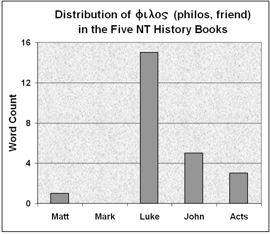
As we shall see, these parables peculiar to Luke are characteristic in
that they are taken up with the great truths of love, grace, forgiveness and
condescension. ... It is most distinctive of him to select for his narrative
those incidents and discourses which speak most eloquently of Jesus
as the Friend of all sinners, even the most depraved, the Associate and
Healer of all souls even the most sick and wounded. ... It is Luke, above all others,
who represents the Son of Man as the Physician whose joy it is to
give access to Himself in the most diseased and sunken among them.
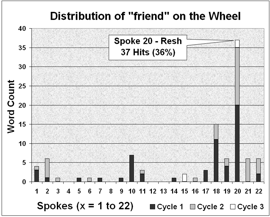 The miracle of God is that these themes are also characteristic of Proverbs.
The graph below shows the distribution of the word "friend" in the KJV on the Wheel.
The largest black peak represents the 20 hits from Proverbs. It aligns with the second largest peak
of 15 hits found in Luke. And what of that little white bar on top of the peak on Spoke 20?
That marks the two hits from the tiny Book of 3 John! The common theme of Spoke 20 is now
visually evident. The graph shows in a glance what would be plainly evident after a carefully reading
of all the Books of the Bible. The theme of friend, based on the Resh KeyWord reyah,
dominates Spoke 20. Indeed, "there is a friend [Jesus Christ] who sticks closer than a brother" (Prov 18:24).
The miracle of God is that these themes are also characteristic of Proverbs.
The graph below shows the distribution of the word "friend" in the KJV on the Wheel.
The largest black peak represents the 20 hits from Proverbs. It aligns with the second largest peak
of 15 hits found in Luke. And what of that little white bar on top of the peak on Spoke 20?
That marks the two hits from the tiny Book of 3 John! The common theme of Spoke 20 is now
visually evident. The graph shows in a glance what would be plainly evident after a carefully reading
of all the Books of the Bible. The theme of friend, based on the Resh KeyWord reyah,
dominates Spoke 20. Indeed, "there is a friend [Jesus Christ] who sticks closer than a brother" (Prov 18:24).
The word "friend" also distinguishes parallel passages
between Matthew and Luke. The table below displays four parallel passages where Luke adds a reference to
friend not found in Matthew. We saw the same thing with the Resh KeyWord ra'ah (to see) as discussed in the article The Lord Looked.
This should be compared to the dominance of righteousness in Matthew (BW book
pg 325).
| Parallel Passages where Luke = Matthew . Friend | |
| MATTHEW |
LUKE |
| The Centurionís Servant |
| [8:5] There came unto him a centurion, beseeching him, And saying, Lord, my servant lieth at home sick of the palsy, grievously tormented. And Jesus saith unto him,
I will come and heal him. The centurion answered and said, Lord, I am not worthy that thou shouldest come under my roof: but speak the word only, and my servant shall be healed. |
[7:4] Then Jesus went with them. And when he was now not far from the house, the centurion sent friends to him, saying unto him, Lord, trouble not thyself:
for I am not worthy that thou shouldest enter under my roof: Wherefore neither thought I myself worthy to come unto thee: but say in a word, and my servant shall be healed. |
| Lost Sheep |
| [18:12] How think ye? if any man have a hundred sheep, and one of them be gone astray, doth he not leave the ninety and nine, and go unto the mountains,
and seek that which goeth astray? And if so be that he find it, verily I say unto you, he rejoiceth over it more than over the ninety and nine which have not gone astray. |
[15:4] What man of you, having a hundred sheep, and having lost one of them, doth not leave the ninety and nine in the wilderness, and go after that which is lost,
until he find it? And when he hath found it, he layeth it on his shoulders, rejoicing. And when he cometh home, he calleth together his friends and his neighbors,
saying unto them, Rejoice with me, for I have found my sheep which was lost. |
| Warning of Hellfire |
| [10:28] And fear not them which kill the body, but are not able to kill the soul: but rather fear him which is able to destroy both soul and body in hell. |
[12:4] And I say unto you my friends, Be not afraid of them that kill the body, and after that have no more that they can do.
But I will forewarn you whom ye shall fear: Fear him, which after he hath killed hath power to cast into hell; yea, I say unto you, Fear him. |
| Hated for Christís Sake |
| [10:21] And brother shall deliver up brother to death, and the father his child: and children shall rise up against parents, and cause them to be put to death. And ye shall be hated of all men for my name's sake: but he that endureth to the end, the same shall be saved. |
[21:16] And ye shall be betrayed both by parents, and brethren, and kinsfolks, and friends; and some of you shall they cause to be put to death.
And ye shall be hated of all men for my name's sake. But there shall not an hair of your head perish. |
|
